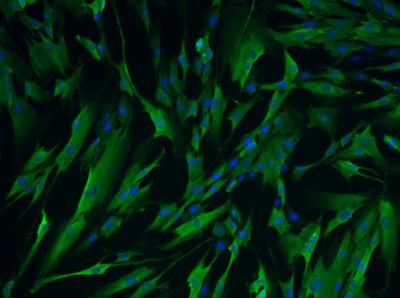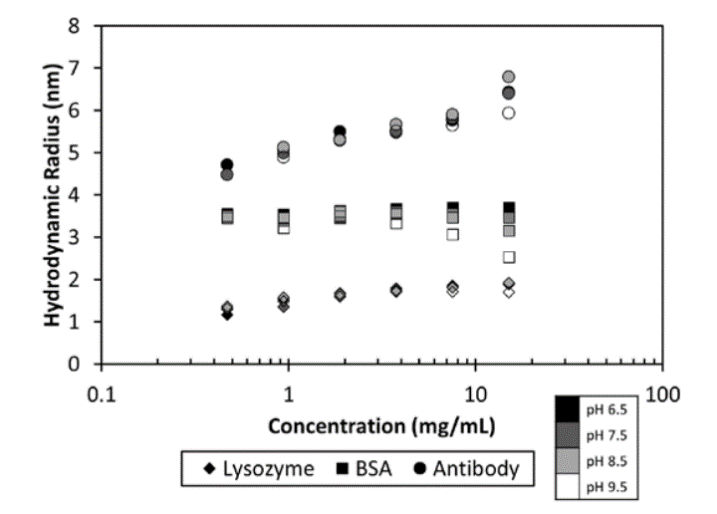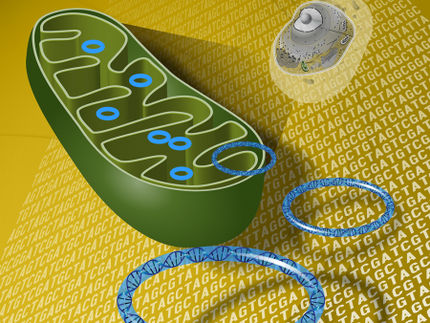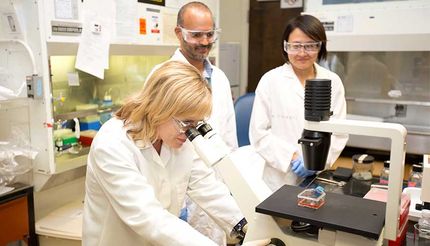RNA offers a safer way to reprogram cells
New technique could revert cells to immature state that can develop into any cell type
In recent years, scientists have shown that they can reprogram human skin cells to an immature state that allows the cells to become any type of cell. This ability, known as pluripotency, holds the promise of treating diseases such as diabetes and Parkinson's disease by transforming the patients' own cells into replacements for the nonfunctioning tissue.

MIT researchers used RNA to induce these fibroblast cells to express four genes necessary to reprogram cells to an immature state.
Yanik Laboratory, MIT
However, the techniques now used to transform cells pose some serious safety hazards. To deliver the genes necessary to reprogram cells to a pluripotent state, scientists use viruses carrying DNA, which then becomes integrated into the cell's own DNA. But this so-called DNA-based reprogramming carries the risk of disrupting the cell's genome and leading it to become cancerous.
Now, for the first time, MIT researchers have shown that they can deliver those same reprogramming genes using RNA, the genetic material that normally ferries instructions from DNA to the cell's protein-making machinery. This method could prove much safer than DNA-based reprogramming, say the researchers, Associate Professor of Electrical and Biological Engineering Mehmet Fatih Yanik and electrical engineering graduate student Matthew Angel.
However, the researchers say they cannot yet claim to have reprogrammed the cells into a pluripotent state. To prove that, they would need to grow the cells in the lab for a longer period of time and study their ability to develop into other cell types — a process now underway in their lab. Their key achievement is demonstrating that the genes necessary for reprogramming can be delivered with RNA.
"Before this, nobody had a way to transfect cells multiple times with protein-encoding RNA," says Yanik. (Transfection is the process of introducing DNA or RNA into a cell without using viruses to deliver them.)
In 2006, researchers at Kyoto University showed they could reprogram mouse skin cells into a pluripotent, embryonic-like state with just four genes. More recently, other scientists have achieved the same result in human cells by delivering the proteins encoded by those genes directly into mature cells, but that process is more expensive, inefficient and time-consuming than reprogramming with DNA.
Yanik and Angel decided to pursue a new alternative by transfecting cells with messenger RNA (mRNA), a short-lived molecule that carries genetic instructions copied from DNA.
However, they found that RNA transfection poses a significant challenge: When added to mature human skin cells, mRNA provokes an immune response meant to defend against viruses made of RNA. Repeated exposure to long strands of RNA leads cells to undergo cell suicide, sacrificing themselves to help prevent the rest of the body from being infected.
Yanik and Angel knew that some RNA viruses, including hepatitis C, can successfully suppress that defensive response. After reviewing studies of hepatitis C's evasive mechanisms, they did experiments showing they could shut off the response by delivering short interfering RNA (siRNA) that blocks production of several proteins key to the response.
Once the defense mechanism is shut off, mRNA carrying the genes for cell reprogramming can be safely delivered. The researchers showed that they could induce cells to produce the reprogramming proteins for more than a week, by delivering siRNA and mRNA every other day.
Original publication: Matthew Angel and Mehmet Fatih Yanik; "Innate Immune Suppression Enables Frequent Transfection with RNA Encoding Reprogramming Proteins"; PLoS ONE 23 July, 2010
Most read news
Topics
Organizations
Other news from the department science

Get the life science industry in your inbox
By submitting this form you agree that LUMITOS AG will send you the newsletter(s) selected above by email. Your data will not be passed on to third parties. Your data will be stored and processed in accordance with our data protection regulations. LUMITOS may contact you by email for the purpose of advertising or market and opinion surveys. You can revoke your consent at any time without giving reasons to LUMITOS AG, Ernst-Augustin-Str. 2, 12489 Berlin, Germany or by e-mail at revoke@lumitos.com with effect for the future. In addition, each email contains a link to unsubscribe from the corresponding newsletter.
More news from our other portals
Last viewed contents
Spore
Stuart_Kauffman
Stingray soft robot could lead to bio-inspired robotics

pH Theory Guide - A Guide to pH Measurement Practice and Applications
Barry_Posner
Lynn_Margulis
BBCH-scale_(sunflower)
Rugogaster
























































